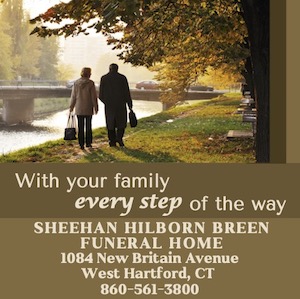
By Stacey Dresner
HAMDEN – “To me, faith is the belief that you were put here for a purpose,” says Rabbi Herbert Brockman of Congregation Mishkan Israel in Hamden.
For the members of Brockman’s synagogue, part of their purpose for the past year has been to help safely resettle Syrian refugees in the greater New Haven area.
Their efforts can be viewed in “Faith Over Fear: Welcoming Refugees Through Faith in Connecticut,” a video produced by THE NGO Religions for Peace International and UNICEF.
Earlier this year, the two organizations launched “Faith Over Fear,” a campaign to promote refugee resettlement around the world.
“It occurred to them that all over the world one of the main resources for refugee resettlement were the religious communities,” explained Brockman, who added that “of the nine refugee resettlement agencies in the U.S., six of them are religious” including HIAS, the one representing the Jewish community and IRIS in New Haven, which is affiliated with the Lutheran Church.
“Its amazing what the religious community can do…the UN wanted to promote that,” Brockman said.
The five-minute video featuring Mishkan Israel is just one of three videos telling the story of Syrian refugee resettlement efforts from the point of view of religious communities.
Another video highlights a German couple who take in a Syrian family, aided by their Protestant church. The third video shares the story of the Syrian family taken in by Pope Francis and the Vatican in Rome.
“Diverse religious communities share the conviction that caring for refugees is an urgent religious obligation,” said Dr. William Vendley, secretary general of Religions for Peace. “There are no walls high enough to protect us from the suffering of refugees. Each believer, each mosque, synagogue, church and temple can make a vital difference.”
Congregation Mishkan Israel in Hamden has been making a difference to refugees since the early 1990s when they helped resettle seven Jewish Russian families from the former Soviet Union in New Haven.
“Then in the mid-90s, having had that experience, we decided we would see if we could try to do it with a family that wasn’t Jewish and yet was still in harms way, so we brought over a Bosnian Muslim family. Then about five or six years ago we brought in an Iraqi family,” said Brockman.
When the rabbi saw news reports of Alan Kudi, the small Syrian boy who had drowned and washed up on the shore of Turkey in 2015, he knew members of Mishkan Israel had the experience – and the motivation – needed to help other refugees fleeing civil war in Syria.
Brockman spoke about the incident from the pulpit and his congregation “began talking about doing more.”
He subsequently went to a meeting of Integrated Refugee & Immigrant Services (IRIS), a refugee resettlement agency in New Haven, to talk about the congregation’s hope to resettle more refugees. At the meeting, the rabbi met representatives from other local synagogues that were there with the same idea. An idea took root.
“As we walked out, we began to say, ‘wouldn’t it be nice if we worked together in a coalition?’ We’d never really done this as a community. We said, ‘Wow, this is really great!’” Brockman recalled.
A year and half ago, the group launched the Jewish Community Alliance for Refugee Resettlement – or JCARR – with the intention of co-sponsoring refugee families coming to the New Haven area.
In addition to Mishkan Israel, JCARR members include Temple Emanuel of Greater New Haven in Orange, Congregation B’nai Jacob in Woodbridge, Congregation Beth El-Keser Israel (BEKI) in New Haven, Congregation Or Shalom of Orange, as well as the Jewish Community Relations Council, the Jewish Federation of Greater New Haven, and IRIS.
According to the JCARR website, “While the synagogues span different denominations of Judaism, all recognize that one of the Torah’s strongest themes is the obligation to love the stranger.”
JCARR’s first ‘client’ family was from the Republic of Congo. The family eventually moved to Michigan to live with other family members.
Next, JCARR came to the aid of two families from Syria – one made up of a parents and their two children; the other made up of parents and their three children.
JCARR’s members found and paid for six months of housing for the families, furnished the homes, helped them find work, learn to drive, and otherwise acclimate to life America.
“Cooperating among synagogues is a wonderful experience. We all have a single mission: to help these families,” Brockman said.
Mishkan Israel became the focus of the “Faith Over Fear” video when the producers were looking for a religious community in the United States to film. They already had the German family and the Pope’s Syrian refugees lined up.
“They wanted to do an American one as well and they were thinking, ‘How could we frame this? Oh, Jews bringing in Muslims, now there’s a hook,’” Brockman said. “They called HIAS and it just so happened that I had been in contact with HIAS. They told them to call Mishkan Israel.”
The filmmakers spent three days at Mishkan Israel filming Rabbi Brockman addressing his congregation in the sanctuary and teens in the shul’s confirmation class carrying furniture into and setting up a residence for one of the Syrian families, interspersed with scenes of today’s Syrian refugees and yesterday’s Jewish refugees.
“These past months have brought many outrageous and cruel attacks on these refugees,” Brockman can be heard telling his congregation in the video. “The Jewish community knows from these examples only too well. They resonate deeply in some of the darkest moments of our own communal memory.”
Mishkan Israel member Jackie Sidle serves on the “healthcare team” which takes the Syrian family members to doctor’s appointments. In the video, she talks about why she feels “helping the stranger” is so important to her.
“People say how will history will judge us because we look back at the Holocaust or times when people were driven from their country, and you say ‘well, why didn’t people help? If I was there I would have helped’ And now it is happening here, so I am walking the walk,” she says in the video.
The completed videos went online a few days before the UN’s World Refugee Day on June 20.
“It puts a face on why a religious community does this,” Rabbi Brockman said. “From the very beginning when we were schlepping out of Egypt one of the first obligations we were told to do once we got into the promised land was to create six cities of refuge, to provide shelter for people. It has always been important to us. If we don’t understand what it is like to be refugees, who will? …Our experience has to have meaning or it is just tragedy. What raises the level of that tragic history of ours is giving it meaning. It’s in the Jewish DNA.”
“Faith Over Fear: Welcoming Refugees Through Faith in Connecticut,” can be viewed at http://cmihamden.org/2017/06/faith-over-fear/.
CAP: Rabbi Herbert Brockman in his office at Mishkan Israel.








 Southern New England Jewish Ledger
Southern New England Jewish Ledger










